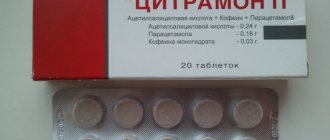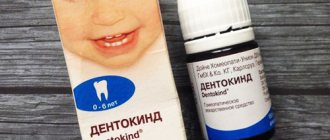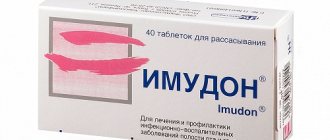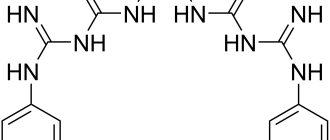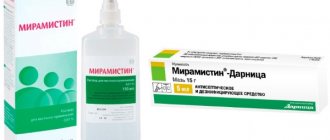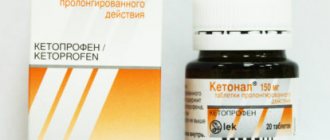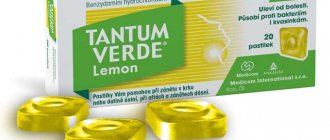Pharmacological action: what does the medicine help with?
The pharmacological action of Analgin consists of the following features of the drug:
- Relieves pain;
- Relieves inflammation;
- Reduces temperature.
Due to its ability to quickly dissolve in water and penetrate into the blood, the drug is used as a method of emergency care for the patient.
Analgin injections are especially effective - they act almost instantly and are less harmful to the gastrointestinal microflora.
The mechanism of action is based on blunting the production of prostaglandins, slowing pain impulses, increasing the threshold of excitability of pain sensation centers, and reducing the production of neutrophil granulocytes.
Indications for use
Indications for use are directly related to what Analgin helps with:
- Pain syndromes with spasms of smooth muscles of internal organs of varying severity. Can be taken to eliminate symptoms of myalgia and neuralgia, diseases of the musculoskeletal system (sciatica), dysmenorrhea. Does analgin help with headaches? The answer is yes. The product also copes with toothache, spasms during burns and during the recovery period after surgery. Combined use with antispasmodics allows you to get rid of colitis.
- Fever, which occurs due to infection or inflammatory processes in the body. However, it is better to consult a doctor before use.
Instructions: how to use an analgesic correctly
The injection solution is administered both intramuscularly and intravenously. The method of injection and the amount of the drug used at a time is determined by the doctor depending on the pathology. Injection into a vein has the best analgesic effect.
The optimal temperature for administration is approximately 360C. To avoid surges in blood pressure, inject the drug into a vein slowly. A long needle is used. The patient must lie down during the procedure.
The dosage described in the instructions for use depends on age:
- Adults are administered up to 1 ml twice or thrice a day. The maximum permissible daily dose is 2 ml.
- Children under one year of age are allowed only intramuscular injections. The dose depends on the mass per kilogram of 0.01 ml. The course of therapy lasts no more than 3 days.
- You can calculate the dosage for a baby older than one year, referring to the child’s age. For every year of life you need to take 0.1 ml. 1 or 2 injections are allowed per day. The maximum duration of treatment is 3 days.
Analgin tablets are taken after meals. It is advisable to drink them with water. This dosage form is not prescribed to children under 12 years of age.
Analgin's instructions indicate the following dosage:
- Adults and children over 14 take 0.5-1 (0.25-0.5 g) capsule 1-2 times a day.
- Children aged 12 to 14 years are allowed to take only half a capsule 1-2 times a day.
Therapy lasts up to 3 days.
Before starting treatment, you should consult your doctor about how much and how to take Analgin.
Contraindications
Do not take the medicine if you are hypersensitive to the active substance or auxiliary components. Contraindications for Analgin also include:
- The period of pregnancy (especially in the first and third trimesters) and breastfeeding;
- Age under 12 years (for capsules);
- Allergy to non-steroidal drugs with anti-inflammatory effects;
- Problems with blood consistency;
- Bone marrow disorders;
- Hypotension;
- Alcoholism;
- Kidney and liver diseases;
- Bronchial asthma;
- Anemia.
You should not take the medicine if the pain is localized in the abdominal area and its causes are unknown.
Release form
"Analgin" is produced in the form:
- ampoules;
- rectal suppositories;
- tablets.
According to reviews, the latter form is used more often. Analgin tablets include the main active ingredient – metamizole sodium. Excipients include potato starch and talc. It also contains calcium stearate and sodium lauryl sulfate. Tablets allow you to quickly get rid of pain because they begin to act almost instantly.
Side effects and possible harm of tablets and injections
Side effects can be caused by both an overdose and individual intolerance to the drug.
When consuming an excessive dose of capsules, the following occurs:
- Increased body temperature;
- Pulse jumps;
- Hypotension;
- Breathing problems;
- Hearing impairment;
- Nausea and vomiting;
- Cutting pain in the gastrointestinal tract;
- General lethargy and desire to sleep;
- Disorientation in space, dizziness, loss of consciousness;
- Cramps.
To get rid of the symptoms, you need to stop using the medication, artificially induce vomiting, and rinse the stomach. As for medications, it is allowed to take enterosorbents and salt-type carriers. In severe cases, you will have to resort to blood purification. At the first signs of an overdose, you should immediately consult a doctor.
Side effects from the capsules may include:
- Allergies in the form of skin rash and damage to mucous membranes, the development of conjunctivitis, itching, swelling, anaphylactic shock.
- Violations of the consistency of lymph and blood (anemia, leukopenia, thrombocytopenia);
- Problems in the functioning of the excretory system, including kidney pathologies. The discharge will take on a reddish tint.
- Development of hepatitis;
- Hypotension.
The occurrence of side effects requires discontinuation of the medication and consultation with a doctor.
An overdose of Analgin solution manifests itself similarly to the symptoms of consuming a large number of tablets. Emergency care includes inducing vomiting, intestinal lavage with a probe, and the use of charcoal and analogues. The hospital is doing blood purification.
Harm from Analgin injections can manifest itself in the form of:
- Pathologies of the liver and gall bladder (including hepatitis);
- Disturbances in the functioning of the excretory system and kidneys (typically red staining of urine);
- Problems with the heart and blood vessels: hypotension, increased pulse;
- Violation of the blood structure;
- Allergic reactions;
- Common symptoms at the injection site: fluid discharge, swelling, rash and itching.
Adverse reactions after taking Analgin
List of side effects of Analgin:
- In the area of the urinary system, malfunctions of the kidneys , manifestations of oliguria, anuria, and proteinuria are possible. Possible nephritis of an interstitial nature, a change in the color of urine to red.
- The allergic response manifests itself in the form of urticaria, Quincke's edema . In some situations, Stevens-Johnson syndrome occurs, there is a risk of developing anaphylactic shock, epidermal necrolysis of toxic origin, and bronchospastic phenomena.
- In the area of hematopoiesis, the corresponding organs react negatively in the form of leukopenia, agranulocytosis . There is a possibility of developing thrombocytopenia of immune origin.
You should monitor your blood pressure; heart rhythm disturbances are possible.
Interaction
Analgin for fever is pharmaceutically incompatible with a large number of medications. Therefore, it is forbidden to mix the solution with other medications inside the syringe.
The following products cannot be used during treatment:
- Ethanol (to avoid its increased effects);
- Phenothiazine derivatives (there is a danger of a significant increase in temperature);
- Penicillin;
- Cyclosporine (is eliminated from the body more quickly);
- Hypoglycemic medications;
- Glucocorticosteroids;
- Ibuprofen (metamizole increases the activity of the component);
- Hepatoinducers (reduce the effectiveness of the analgesic);
- Non-narcotic painkillers, antidepressants and oral contraceptives (may increase the toxicity of the drug);
- Other NSAIDs (the risk of adverse reactions increases);
- Sarcolysin and Mercazolil;
- Antihyperglycemic medications;
- Myelotoxic drugs;
- Methotrexate (metamizole promotes the accumulation of the component in the blood and increases its negative effect on the gastrointestinal tract).
Before starting a course of therapy, it is important to check with your doctor about the compatibility of the analgesic with other medications used.
The effectiveness of the drug when taken in parallel with other drugs
Let's consider the features of drug interaction:
- If Analgin is used with other non-narcotic analgesics, then one can expect a mutual increase in their toxic effect.
- Due to interaction with tricyclic antidepressants, oral contraceptives, and allopurinol, metabolic processes in the liver fail, which leads to increased toxicity of metamizole.
- The effect of administration is reduced under the influence of barbiturates and phenylbutazone. The drug itself can enhance the effect of drinks with alcohol.
- Agents used as contrast for X-rays, as well as colloid-type blood substitutes and penicillin, are not used in conjunction with Analgin.
- The effect of metamizole sodium on hypoglycemic agents, indirect anticoagulants, glucocorticosteroid substances and indomethacin is known to displace protein bonds. At the same time, their activity increases.
- Analgin is able to reduce the presence of cyclosporine in the blood.
- Combined use with thiamazole and sarcolysin provokes leukopenia.
One can expect an increase in the analgesic effect under the influence of sedatives and tranquilizers.
How to take it correctly
When administering the medication intravenously or intramuscularly, it is necessary to regularly see a doctor due to the high likelihood of developing allergies and side effects. The medication is not injected under the skin.
Treatment of a child requires regular monitoring of blood composition. If taking the drug for more than a week, adult patients should have their blood checked, as well as the condition of their liver and kidneys.
During the entire course of therapy, it is advisable to keep antishock therapy on hand.
Do not inject the drug for pain in the abdominal area until the cause is determined. Analgin at a temperature can mask the symptoms of pathologies of an inflammatory and infectious nature, therefore, if you suspect their presence, it is recommended to first undergo diagnostics.
It is better to refrain from therapy for elderly people and patients suffering from intestinal inflammation.
Regular long-term courses of treatment are excluded due to the high toxicity of the active substance.
If any side effect occurs, stop taking NSAIDs.
It is strictly forbidden to use an analgesic during pregnancy. If there is a need for therapy during lactation, breastfeeding should be suspended.
Taking NSAIDs eliminates driving and work that requires concentration and quick reaction.
Lack of improvement implies the abolition of this remedy and the introduction of a new one.
special instructions
The analgesic effect of the drug increases if it is combined with vitamin B1, codeine, and phenobarbital. If you take this medicine for a long time, you need to regularly check your blood composition. This medication in aqueous solution cannot be combined with oxidizing agents due to the fact that oxidation occurs with mixing.
Taking into account the reviews of doctors, Analgin is a pyrazolone derivative. It has antipyretic, anti-inflammatory, analgesic effect. If you have any doubts about taking the drug, it is advisable to consult a specialist.
Analogs of Analgin
In addition to the fact that the medicine is produced by various pharmaceutical companies, there are analogues of Analgin
A:
- Baralgin;
- Kofalgin;
- Maxigan;
- Pentalgin;
- Pyatirichatka
- Revalgin;
- Renalgan;
- Reonalgon;
- Sedalgin Plus;
- Spasmadol;
- Spasmalgon;
- Tempalgin;
- Tetralgin;
- Trinalgin.
Baralgin or Analgin – what to choose?
Beralgin is available in the form of tablets and injections. The drugs have similar pharmaceutical effects.
In addition to mitamizole sodium, ampoules and capsules contain pitofenone hydrochloride and fenpiverine bromide.
Although Beralgin is intended to treat any pain of moderate to mild severity and reduce fever, it is most often used for abdominal cramps (therapy for colitis and dyskinesia).
The drug is not prescribed to patients under 15 years of age. Beralgin has more side effects - to those that may occur when using the medication described in the article are added:
- Sore throat;
- Visual impairment;
- Dehydration, constipation;
- Urinary retention;
- The appearance of bronchospasm.
The distinguishing factor is the price. For 5 ampoules of Beralgin with a capacity of 5 ml you will have to pay 5 times more than for 10 ampoules of Analgin with a capacity of 2 ml. The price of tablets for the first is approximately 3 times higher than for the second.
Tempalgin and Analgin - which is better?
Tempalgin is available only in tablet form - if you need an injection, this product will not work.
The active ingredients in the composition are matamizole sodium monohydrate and tempidone. Tempalgin is a weaker drug, it is used to get rid of short-term, mild spasms.
The drug has quite a few adverse reactions, including:
- Blood structure disorders;
- Allergy;
- Lack of appetite;
- Nausea and abdominal pain, less often – hemorrhages in the gastrointestinal tract;
- Pathologies of the liver and kidneys.
The drug is not prescribed to patients under 15 years of age. Tempalgin tablets are 4 times more expensive than the price of Analgin.
It is impossible to single out the best drug - medications are prescribed depending on the type and degree of development of the pathology.
Analgin or Revalgin – which is cheaper in price and by how much?
Revalgin is available in the form of a solution for injections and tablets. The active ingredients include metamizole sodium, fenpiverinium bromide, and pitofenone hydrochloride.
Indications for use of Revalgin are mild pain. The medication is prohibited for use in children under 15 years of age.
Side effects of Revalgin include:
- Allergies;
- Dehydration, abnormal stool consistency, exacerbation of gastritis;
- Visual impairment and migraines;
- Hypotension;
- Pathologies of the kidneys and blood.
Revalgin tablets are approximately four times more expensive than Analgin. 5 ampoules of 5 ml of the first product cost the same as almost three packages of 10 ampoules of 2 ml of the second.
Overdose
The average lethal dose is 5 g. It is different for all people. This is determined by weight, intestinal absorption capacity and other factors. Taking a large amount of the drug is likely to cause:
- low blood pressure;
- vomiting;
- rapid heartbeat;
- stomach ache.
With an overdose, seizures occur. A person may experience delirium and impaired consciousness. Possible drug poisoning. When taking a large number of tablets, loss of consciousness occurs and a person falls into a coma. There is a high risk of death.
In case of overdose, you must call an ambulance. Before her arrival, vomiting should be induced. You can give the victim an enema. Activated carbon will also improve your condition.
